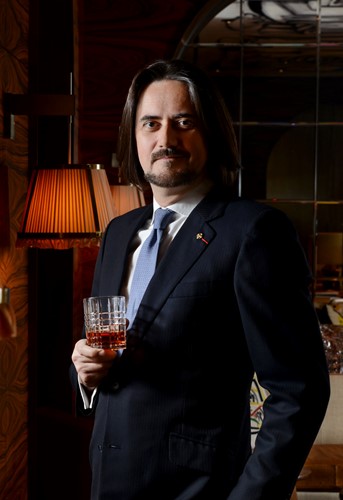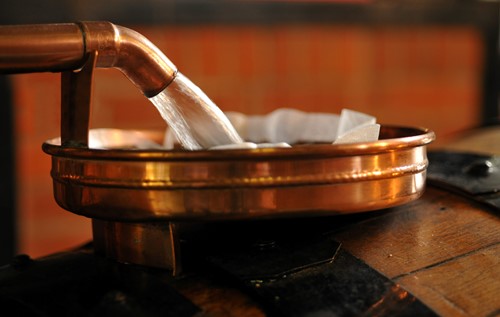25 March 2020
Speciality Drinks presents 'Bring the Bar Home'
A few weeks ago, the idea of not being able to visit a favourite bar (or any bar for that matter!) whenever you wanted was unthinkable for most consumers...
Read more12 March 2024
PeopleThe CEO of Camus discusses his role in shaping the brand’s modern identity, and how to revisit distillery processes to achieve the perfect balance of flavour
In most industries, 160 years of history counts for a huge amount. But perhaps more than any other, Cognac is a spirit whose identity is shaped by the presence of large, historic producers that dominate the landscape. Just like there is plenty of quality and character to discover in the region’s lesser-known crus, though, there are brands bringing fresh ideas to the table, unencumbered by an enormous global profile and the quarter of a millennium of heritage that some of the region’s larger houses can boast.
“We’re only 160 years old, so we're one of the young Cognac companies,” says Cyril Camus, the company’s CEO, who continues a long line of family members to have taken complete control of the company’s destiny. “We were created in the end of the 19th century in 1863, at a time where Cognac was growing rapidly, when there was a restarting of the trade between France and England. It was good times for Cognac, but that created a lot of tension between the wine growers and the trading houses, and Camus was a family of wine growers. Among those tensions, there were a number of wine growers in the region that decided to start trading under their own brand as opposed to supplying existing brands. So that's how we got created in 1863.”
The brand is known for beautiful, elegant blends from across Cognac’s crus, which especially other Cyril’s guidance has made innovations in its distillation and maturation programmes, and found an approach rooted in razor-sharp control of its processes and the aim of finding the perfect balance of fruity and floral flavours, and perfect integration of oak. Here, Cyril talks to us about being a modern brand with a century and a half of family heritage, taming terpeneols, and an intriguing project that reinvents the often overlooked, distinctive character of Cognac from the Île de Ré region.

You’re a family-owned business. How does this inform your approach to Cognac making?
A lot of what we do has been shaped by how the company was created and why it was created. We're the last international-scale company to be still fully family-owned from the founding family, but most of the other ones in the top five would be anywhere from 100 to 150 years older than us.
There’s this notion of claiming one's independence and wanting to do our own thing in the markets, and having a certain amount of freedom to do what we thought was right. That's something that stayed on for the past 160 years now. We’ve always believed within the family that being family owned was the key to maintaining this independence of thought and independence in doing things – and to have all the decision-making abilities and the fate of the company all in the hands of just one person. Because if you have five, ten family owners, you become not that different from other corporations or group-owned brands where you develop an aversion to risk, you develop difficulties of reinventing the brand. You develop difficulties abandoning the past or reinventing yourself, or you get fixed in that past.
And so we believe in having a single shareholder structure every generation – one family member concentrating the shareholding and running the company, was the best way to make sure that we would not be just a company respecting traditions from 150 years ago, but a company that creates its own living tradition. So we have heritage, we've got 160 years of family ownership, but the company today has nothing to do with what the company was 160 years ago. We are not claiming that our Cognac is great because it's the same thing as it was 160 years ago. No, our Cognac is great because for 160 years, we've been focused on making it better and reinventing ourselves and always challenging that heritage and that path. So it's a good base to build from, but it's something we have to expand on all the time.
How do you balance that history with the reality of being a brand in the modern landscape?
I’m very involved in using current science to revisit traditions – I always have been. When I was 20 or so years old, after I lived in the US and China and studied abroad, I came back and joined the business, and I met a lot of people from my father or my grandfather's generation who kept on saying, ‘Oh, it used to be better before. We used to do things differently.’ And actually, instead of just ignoring this, I say, ‘Well, tell me how did you do it? Let's do it again. Let's measure it. Let's experiment with it.’
So we revisited all those discounted traditions, and looked at every step of the production process through the eye of measurement, to get an objective look at things. And that allowed us actually to tweak so many things in how we produce our Cognac to reach what is now a level of aromatic intensity that doesn't exist anywhere else in any other brand. And it's something we can actually share very easily with everyone as well, because that's been a 25-year process. So if anyone wants today to match our aromatic intensity, it's going to take them 25 years to get there, because it starts with the vineyards and the varietals you're using, where it's planted, how you harvest, details of the harvesting methodology, how you press, how you distil of course, and then the ageing and so on.
How does this approach affect those processes individually?
We started from the consumers, asking them, ‘What are your criteria to define the quality of a Cognac?’ Beyond age and quality, XO versus VS versus VSOP and so on, ‘What are you looking for in a Cognac that will define for you this one is better than another?’ And it always came back to the same three things: the intensity or the presence of the floral aromas, intensity of the fruity aromas, and the balance with the wood. No one wants too much wood in their Cognac. Somehow the oakiness doesn't actually work in those criteria and people always want something that is both fruity and floral. And we went and we tackled all of those in our production process.
We renew only 3% of our barrel stock every year. So very, very few new barrels. And one of the things we did was put in this history tracking of every single barrel so we can trace what's been in each barrel over its lifetime and been able to experiment. So it's things like this, small details, but basically, so managing the lifecycle of the barrel and what goes in at what time is something we developed and makes a difference at the end.
For the distillation campaign, we proceed by cru, by growth areas. We always start with the Borderies and then we move outward from there. So Borderies first and then Petit, Grande Champagne, Fins Bois, Bon Bois. We distil on that schedule. Our barrels are all fine grain, all 97% aged barrels. That's one of the specificities.
For floral it’s very simple. Borderies, you have a higher level of terpeneols in the soil at Borderies which you find than in the grapes. As you know, the terpeneols, they're going to be creating the floral aromas, they're the molecules for floral. So all the Cognac blends we have of a high content of Borderies and the Borderies themselves, they've been made with varietals that will bring in more terpeneols. So that's the floral. And the fruity, we increase the notion of vertical aromatics there through the distillation process. The main differentiator is our patented distillation method to extract more esters. So we distil on the lees. We're not the only ones doing that, but we distil everything on the leaves, every single batch.
And we have what we call the ‘ins-tensity’ process: ins-tensity is a combination of an instant and intensity, which really consists that tasting every litre in the heads of the second distillation because this is where the aromatic profile and the compounds that you find will be extremely unstable. So it's a matter of by tasting individually, extracting every litre individually and tasting in there, we can extract the incredible and discount the terrible. And it's amazing how two or three litres in one batch from 25 hectolitres of distilling makes a difference in the final product. So this distilling on the lees and the ins-tensity method really boosts the ester level in our Cognacs.

Can you tell us about your project on the Île de Ré?
Our Ile de Ré is entirely made from the vineyards on the island, and it's already grown and it's distilled on the island, on the last remaining distillery there. But it's a cooperative. What was interesting is there's been vineyards on the Ile de Ré forever, it's always been part of the appellation region, but the Cognacs there, they're so characteristically different that they always had a bad rep in the region. That's the kind of stuff you would bring in your blend when you had no other choice. If there was no Cognac available to put in your blends, you would bring that in. So it wasn't very economically favourable.
And in the end, the economics of it couldn't be sustained so the remaining wine growers got together into a cooperative and for a number of years, they tried to distil to reduce the typicity of the Ile de Ré. When we started working on this project, so that was in 2000, 2001, we actually looked at it and saying, ‘Well it's different. Great, but does it deserve a bad rep? Being different, does it mean it's worse or is it good?’
So we worked with a cooperative and said, ‘L build a brand and sell your product proudly as Cognac from Ile de Ré,’ which they found an interesting approach and agreed on. And then we worked with them to revert back to actually distilling to maximise the typicity of the product, and ageing it with a mix of both small barrels and vats to have actually even less oakiness than you find in traditional Cognacs and let more room for the saltiness and iodine to come through. And we found that actually it was a really, really nice product, just indeed very different – not something that you would use in your blends, but by itself something amazing.
We featured Camus' VSOP Borderies on the tasting mat at our November Speciality Session on Cognac. For samples or more info please enquire with your Speciality Drinks account manager.
25 March 2020
A few weeks ago, the idea of not being able to visit a favourite bar (or any bar for that matter!) whenever you wanted was unthinkable for most consumers...
Read more15 April 2020
Due to the current Covid-19 pandemic the Drinks Trust has faced unprecedented levels of demand for assistance, and is working hard to support those in need.
Read more03 April 2020
To help ensure that drinks industry professionals working from home are as productive as we can be...
Read moreThank you for signing up to our trade newsletter! We look forward to sharing all the latest industry news, trends, events and products with you! You can unsubscribe from this newsletter at any time by emailing us at [email protected]